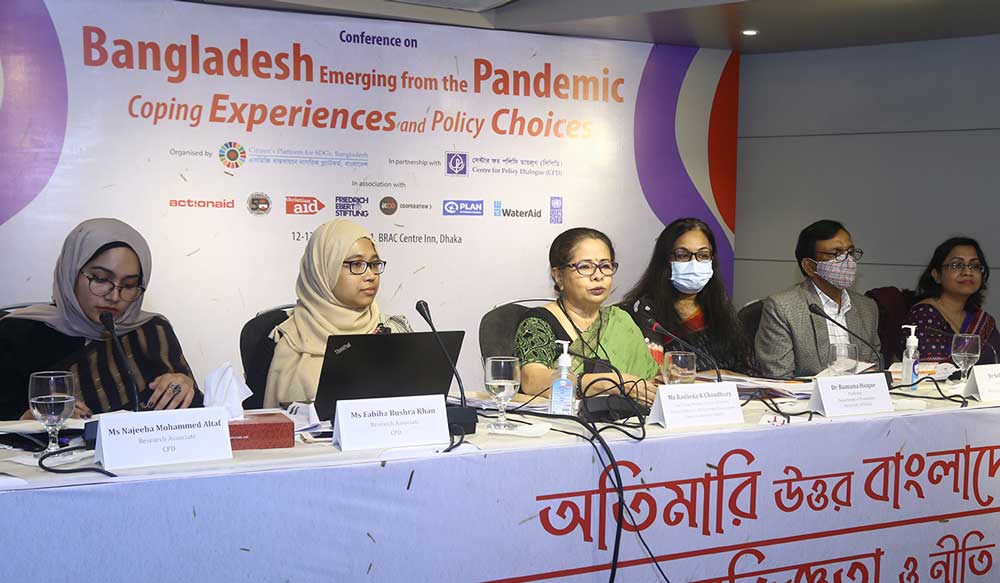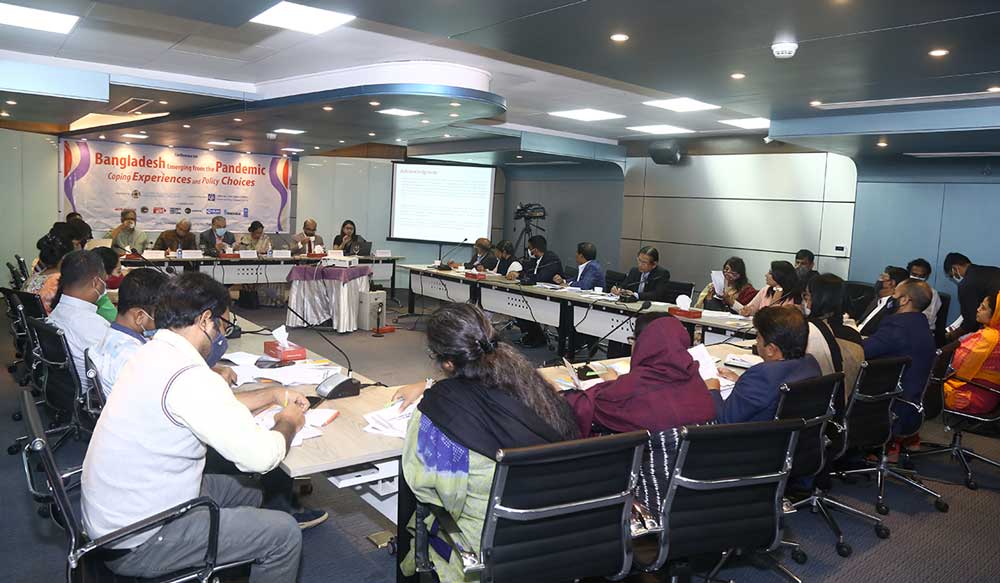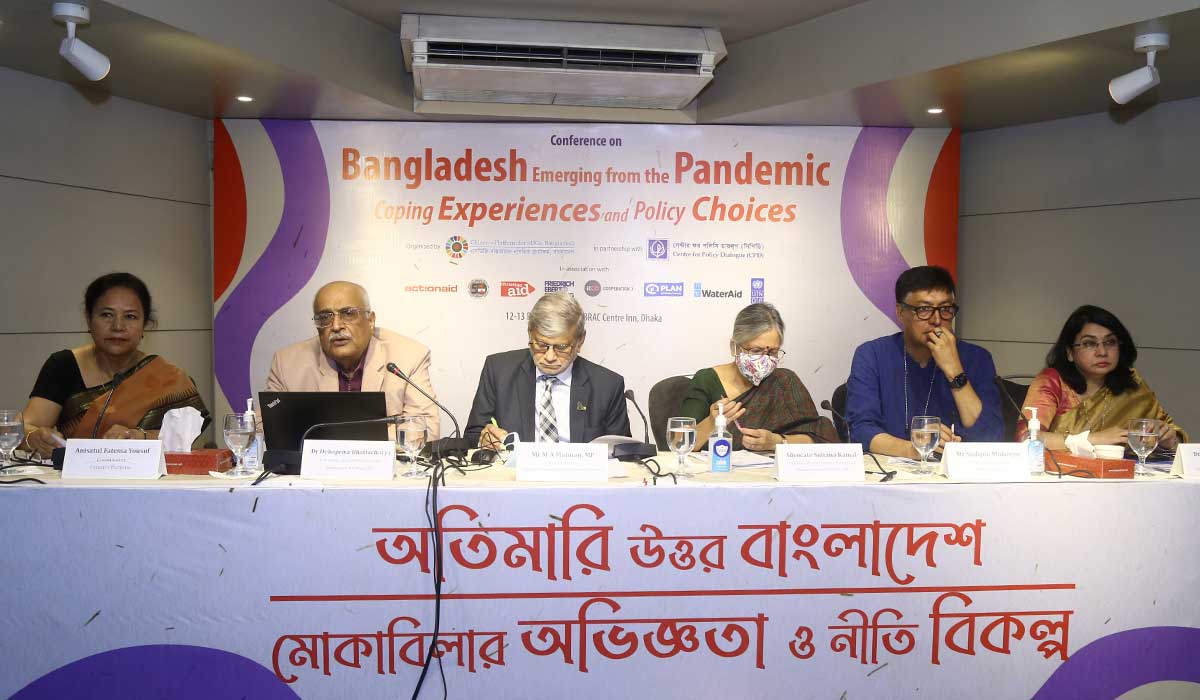Bangladesh is currently dealing with the aftermath of the COVID-19 pandemic which has both impacted the traditionally “left behind” communities disproportionately and also created a new group of “pushed behind” people. The immediate impact of economic adversities has rapidly translated into health, employment, education and other socio-economic fallouts. Households and enterprises are trying to cope with these adverse consequences of the pandemic as best as possible, but the attainment of different targets of the Sustainable Development Goals (SDGs) are being put at great risk.
In this backdrop, Citizen’s Platform for SDGs, Bangladesh in partnership with the Centre for Policy Dialogue (CPD) and other Partner Organisations. organised a two-day Conference titled “Bangladesh Emerging from the Pandemic: Coping Experiences and Policy Choices”, held on 12-13 December 2021 at BRAC Centre Inn, Dhaka. During the last one and a half years, the Citizen’s Platform has invested heavily in exploring the implications of the COVID-19 pandemic on the “left behind” and “pushed behind” people of the country. It has also analysed the effectiveness of the public policy interventions in view of the ongoing pandemic. In the span of various sessions, these research outputs were presented in the conference for validation and dissemination.
The chief guest at the opening session, Mr M A Mannan, MP, Hon’ble Minister, Ministry of Planning, Government of Bangladesh, stated that during pandemic, Bangladesh had done better than many other countries like India and China in terms of growth. Regarding the health sector, he said the government was working on modernising and strengthening around 15,000 community clinics to provide improved health care services. The special guest of this session Mr Sudipto Mukerjee, Resident Representative, UNDP, Bangladesh, appreciated the remedial measures of the government, which managed the Covid-19 fallouts. Advocate Sultana Kamal, Core Group Member, Citizen’s Platform and Member, Board of Trustees, CPD, chaired this session. Ms Anisatul Fatema Yousuf, Coordinator, Citizen’s Platform and Dr Fahmida Khatun, Executive Director, CPD delivered the introductory remarks. Dr Debapriya Bhattacharya, Convenor, Citizen’s Platform and Distinguished Fellow, CPD, made the keynote presentation, where he stated that there was urban-rural migration and further informalisation of the economy with consequent lower wages and higher underemployment.

After the opening session, a plenary session on Macro-economic and Household Level Impact, followed by two parallel sessions on Health, Education, Coping Strategy and Social Safety Net took place. The findings of a survey conducted among 1,600 marginalised households in February this year, showed that 7 out 10 households suffered either job losses or temporary shutdown of business in the early phase of the pandemic. Many “new poor” were excluded from the government’s cash support of Tk 2,500 each to 5 million households, and gratuitous relief that included food assistance and another cash support. It was also shared that macroeconomic stability is no longer in a comfortable state because of rising commodity prices fueled by both international prices and unfavourable government policy, significant negative overall balance of payments leading to reduced foreign exchange reserves, and the volatile exchange rate.
The second day of the conference began with a plenary session on Implications of COVID-19 for the Labour Market where Professor Mustafizur Rahman, Core Group Member, Citizen’s Platform and Distinguished Fellow, CPD, made the keynote presentation. He shared that the pandemic induced economic shutdown and lockdown made more than 60 per cent of employed people in the informal sector unemployed and they could not find jobs for 95 days.

In the closing session, the chief guest Professor Rehman Sobhan, Founding Chair, CPD, said that deprivation of a significant segment of the population during the pandemic has been increasing persistently. He also added that there have been considerable deficiencies both in the commitment of resources and in the utilisation of policy tools. Eminent Economist and Former Advisor to the Caretaker Government Professor Wahiduddin Mahmud said people who were just above the poverty line have always remained at risk of falling into poverty and due to COVID-19, it has been accelerated. Ms Parveen Mahmud FCA, Member, CPD Board of Trustees and Chairperson, UCEP Bangladesh chaired the session. Dr Debapriya Bhattacharya, made the keynote presentation where he discussed Bangladesh’s emergence from the pandemic towards an inclusive and equitable transition. Dr Rounaq Jahan, Distinguished Fellow, CPD and Dr Zahid Hussain, Eminent Economist were present as special commentators.

This Conference was attended by policy actors, academics and experts, development practitioners, international development partners, private sector leaders, Platform Partners and representatives of the media. From the feedbacks received in the discussions from the conference, Citizen’s Platform intends to build a public policy consensus about an inclusive and equitable post-pandemic transition in Bangladesh which is expected to provide added momentum in realising the country’s aspirations to “build back better” from the pandemic and to achieve its medium-term development ambitions.
Related Resources
1. Opening Session
- Seven Elements of COVID Consensus in Bangladesh – Dr Debapriya Bhattacharya
2. Plenary 1: Macro-economic and Household Level Impact
- Macroeconomic Impact and Policy Choices – Towfiqul Islam Khan
- Marginalised Communities in Bangladesh – Estiaque Bari
3. Parallel Session 1: Health and Education
- COVID-19 Impact on Vaccination, Food Consumption, Maternal and Child Health – Fabiha Bushra
- Education during COVID-19: Impact, Coping and Policy support – Najeeba Mohammed
4. Parallel Session 2: Coping Strategy and Social Safety Net
- Strategies applied to cope with COVID-19: Focus on LNOBs and PNOBs – Afra Tahsin
- Relief Supports in Pandemic Times: Raising the Delivery Effectiveness – Muntaseer Kamal
5. Plenary Session 2: Implications of COVID for the Labour Market
- Responding to Covid 19: Findings on Employment Related Adjustments from Household Survey in Bangladesh – Professor Mustafizur Rahman
6. Closing Session
- Towards an Inclusive and Equitable Transition – Dr Debapriya Bhattacharya
Dealing with the aftermath of COVID-19
Working Paper 5
Dealing with the aftermath of COVID-19
Adjustments and Adaptation Efforts of the Apparel Workers in Bangladesh
(Forthcoming)
Coping with the fallouts of COVID-19 and its effects
Working Paper 6
Dealing with the aftermath of COVID-19
Adjustments and Adaptation Efforts of the Apparel Workers in Bangladesh
(Forthcoming)
Will COVID-19 Affect the Delivery of SDGs?
Working Paper 7Will COVID-19 Affect the Delivery of SDGs in Bangladesh?Measurement Issues and Policy Response
(Forthcoming)
COVID impact on various factors
Working Paper 8
COVID impact on Vaccination, Food Consumption, Maternal and Child Health
(Forthcoming)
Education during COVID-19
Working Paper 9
Education during COVID-19: Impact, Coping and Policy Support
(Forthcoming)
About the Conference
Bangladesh is currently dealing with the aftermath of the COVID-19 pandemic which has both impacted the traditionally “left behind” communities disproportionately and also created a new group of “pushed behind” people. The immediate impact of economic adversities has rapidly translated into health, employment, education and other socio-economic fallouts. Households and enterprises are trying to cope with these adverse consequences of the pandemic as best as possible, but the attainment of different targets of the Sustainable Development Goals (SDGs) are being put at great risk. While Bangladesh may take the credit for rolling out of the pandemic support at an early stage, its magnitude, composition and delivery have been subject of much discussion and debate.
During the last one and a half years, the Citizen’s Platform for SDGs, Bangladesh has invested significantly in exploring the implications of the COVID-19 pandemic for the disadvantaged citizens and communities of the country. It has carried out face-to-face surveys and reviewed the national and household level experiences, examined the effectiveness of public policy interventions, and reflected on the country’s development landscape and horizon. The conference is being organised to share some of these scholarly works for further dissemination and validation.
Indeed, through this conference, the Platform intends to build a public policy consensus about an inclusive and equitable post-pandemic transition in Bangladesh. This “consensus” is expected to provide added momentum in realising the country’s aspirations to “build back better” from the pandemic and to achieve its medium-term development ambitions.



 Subscribe
Subscribe